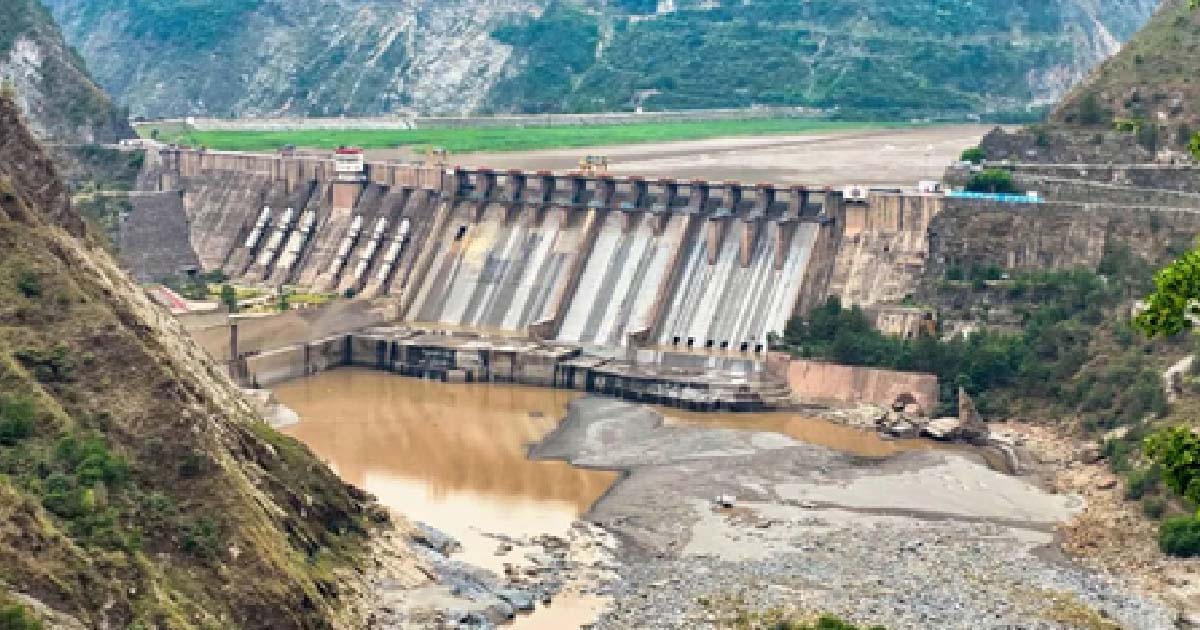National
Desperate Pakistan ‘pleads’ with India to reconsider Indus Waters Treaty suspension

New Delhi, May 15: Nearly a few days into the understanding with Pakistan after the Indian Armed Forces left the Pakistani defence and military shattered, Islamabad has now reportedly written a letter to New Delhi, urging it to reconsider the decision of putting the Indus Waters Treaty which it has put into abeyance.
Pakistan’s Ministry of Water Resources has reportedly written a letter to New Delhi to resume the flow of rivers into its territory under the Indus Waters Treaty, media reports have claimed.
The Indus Waters Treaty is a pivotal water-sharing accord that has endured for more than six decades.
The plea comes after India halted the 1960 agreement in the wake of yet another Pakistan-backed terrorist attack, this time in Jammu and Kashmir’s Pahalgam on April 22, which left 26 civilians dead, mostly tourists.
India, invoking its national security prerogative, has placed the treaty in abeyance until Islamabad “credibly and irrevocably” ends its support for terrorism.
The move was endorsed by the Cabinet Committee on Security (CCS), the apex decision-making body on strategic affairs, marking the first time New Delhi has hit pause on the World Bank-brokered agreement.
In a letter sent to India’s Ministry of External Affairs, the Pakistani Ministry warned that suspending the treaty would trigger a crisis within the country.
Prime Minister Narendra Modi, in his first address since Operation Sindoor, underlined the government’s uncompromising position.
“Water and blood cannot flow together,” he declared.
“Terror and talks cannot happen at the same time. Terror and trade cannot happen simultaneously.”
However, Indian officials have dismissed these concerns, pointing to Pakistan’s longstanding use of terrorism as a state policy.
The treaty allocates three western rivers, Indus, Jhelum, and Chenab, to Pakistan, while the eastern rivers – Sutlej, Beas, and Ravi, remain with India.
India has now announced a three-tier strategy — short-term, mid-term, and long-term to prevent any flow of Indus waters into Pakistan.
Union Jal Shakti Minister C.R. Paatil said that steps are being taken to ensure not a single drop of water is allowed to leave Indian territory unutilised.
India’s Foreign Ministry Spokesperson Randhir Jaiswal reinforced the government’s stance, saying, “The Indus Waters Treaty was founded on goodwill and friendship. Pakistan has trampled on these values by supporting cross-border terrorism for decades.”
The strong response follows Operation Sindoor, a swift military campaign launched after the Pahalgam attack, which resulted in a brief ceasefire agreement. But New Delhi has made it clear: dialogue with Islamabad will now be limited to one agenda — ending terrorism and ensuring the return of Pakistan-Occupied Kashmir.
As per the 1960 treaty, India got around 30 per cent of the total water carried by the Indus River System located in India, while Pakistan got the remaining 70 per cent.
With the Indus Waters Treaty suspended, the Narendra Modi government is expected to take major steps toward completing the stalled hydroelectric projects.
A key meeting is likely to be held this week with Home Minister Amit Shah, along with Water Resources Minister Paatil, Power Minister Manohar Lal Khattar, Agriculture Minister Shivraj Singh Chouhan, and senior officials from all related Ministries. Since the suspension of the Indus Waters Treaty, two meetings have already taken place between Amit Shah, Paatil, and top officials of the Ministry.
Crime
Two Held With ₹68 Lakh Cash Near India-Myanmar Border In Mizoram; Heroin Worth ₹78 Lakh Seized

Aizawl: Two persons were arrested with Rs 68 lakh in cash near the India-Myanmar border in east Mizoram’s Champhai district, officials said on Thursday.
Acting on a tip-off, the Assam Rifles intercepted a vehicle at Zote village on August 11, they said.
Upon thorough checking, Rs 60 lakh in cash was recovered from two persons in the vehicle.
The duo, identified as Joseph Lalthansanga and Vanlalruati, could not state any proper reason why they were carrying such a huge amount of cash. They were subsequently handed over to the police for legal action, officials said.
In another operation, the Assam Rifles recovered 94.6 gram of heroin, worth Rs 78 lakh, from the village on Wednesday.
The drugs were handed over to the Excise and Narcotics Department, officials said.
National
India’s AI Tech Spending Projected To Reach Rs. 92 Thousand Crore By 2028: Report

India’s AI technology spending is projected to grow at an annualised rate of 38 per cent from 2023 to reach $10.4 billion (approximately Rs. 92 thousand crore) in 2028, a report said on Thursday.
Around 40 per cent of organisations in India have already implemented agentic AI, and close to 50 per cent are planning to use the technology within the next 12 months, IDC InfoBrief and UiPath said in a joint report.
In 2025, AI investments are focused on building the foundational infrastructure required to power transformative, high-value use cases.
According to the report, the adoption is surging, fueled by a tech-savvy workforce, expanding digital infrastructure, and government-backed initiatives.
Organisations’ spending on enterprise automation, multilingual AI models, and agentic deployments is driving this momentum further.
The benefits are already visible, as 80 per cent of Indian companies say agentic AI boosts productivity, while 73 per cent say it improves decision-making, the report said.
According to the report, agentic AI is gaining strong traction across the manufacturing, retail and wholesale, healthcare, and life sciences industries, which heavily rely on data and repetitive decision-making cycles.
“Agentic automation is rapidly redefining business operations across India. While enterprises in this region are embracing the full potential of AI agents to streamline workflows and autonomously execute complex business processes, trust and security remain barriers to widespread implementation,” said DebDeep Sengupta, Area Vice President, South Asia, UiPath.
Our agentic automation platform directly addresses these challenges, breaking down barriers to enterprise AI adoption by enhancing security and compliance, improving accuracy and reliability for agentic outcomes, Sengupta added.
About 69 per cent of Indian organisations are using agentic AI to enhance productivity, 59 per cent to drive personalised customer engagement, while 57 per cent apply it to risk and fraud detection, highlighting how agentic AI is being applied across front and back-office functions, the report highlighted.
“Becoming an AI-fueled business is no longer an option in today’s unpredictable climate. For many organisations, it’s fast becoming a strategic necessity,” said Deepika Giri, Associate Vice President, IDC Asia/Pacific.
Across the region, organisations are embracing agentic AI and agentic automation at scale, Giri added.
National
Govt to amend MCOCA to contain smuggling of narcotics: CM Fadnavis

Mumbai, July 2: Chief Minister Devendra Fadnavis on Wednesday told the state council that the state government will move an amendment during the ongoing monsoon session to the Maharashtra Control of Organised Crime Act (MCOCA) to take action against the smuggling of narcotics to deal with the cases in which the accused arrested under the Narcotic Drugs and Psychotropic Substances (NDPS) Act, 1985 received bail.
In his reply to a question by BJP legislator Parinay Fuke, the Chief Minister said that a separate NDPS unit has been set up in every police station in the state and officers and other personnel have been appointed in it. Coordination committees have also been set up at the district level. He added that the police have taken action in a large number of cases in the last two and a half years.
Fadnavis said that with the help of the Central Government, the state-level and inter-state coordination has now become more effective. He also said that intelligence sharing is going on with all the states, and due to this, joint action against smugglers has been possible.
The Chief Minister also said that addiction recovery centres are important and that appropriate policies will be formulated to increase their number and quality, and quality addiction recovery centres will be established. Clarifying that cannabis cultivation is banned and is not legal in Madhya Pradesh, he said that strict action will be taken against anyone smuggling cannabis, gutkha or similar substances.
Meanwhile, CM Fadnavis in his reply to another question raised by Shiv Sena UBT legislator Sunil Shinde said that all cases related to compassionate recruitment of police officers will be resolved on a mission mode in the 150-day plan of the state government. At the same time, orders have been given to all departments regarding compassionate recruitment.
Fadnavis said that the concept of 8-hour duty was first implemented in Mumbai itself. Sometimes there are exceptions during festivals, but overall, the 8-hour duty of the police has now become stable. Also, weekly holidays have been started across the state for the police, and if, for some reason, they do not get the leave, their ‘encashment’ has also been increased on a large scale. Earlier, the amount of this encashment was less, but now it has been increased, he added.
Large-scale housing projects for the police are being implemented across the state, including Mumbai. Work is also going on at a rapid pace at the taluka level. He mentioned that the work of the Police Housing Construction Corporation is unprecedented. Referring to the DG Loan Scheme, CM Fadnavis said that this scheme was started, but it was closed during the previous government. Now the scheme has been restarted, and efforts are being made to clear the backlog.
Addressing the increasing incidence of lifestyle-related diseases among the police, health check-ups have been made mandatory once a year for police officers above the age of 40 and twice a year for police officers above the age of 50. The Chief Minister said that a special scheme of counselling and interaction with senior officers is being implemented for the mental health of the police.
State’s home minister Yogesh Kadam said that the government is implementing many measures for the welfare of the police, in which free treatment is being provided for 40 types of diseases. For this, tie-ups have been made with 270 hospitals in the state. Cancer screening camps have been organised with various hospitals, and Yoga, meditation and gymnasium have been started for the police.
-

 Crime3 years ago
Crime3 years agoClass 10 student jumps to death in Jaipur
-

 Maharashtra1 year ago
Maharashtra1 year agoMumbai Local Train Update: Central Railway’s New Timetable Comes Into Effect; Check Full List Of Revised Timings & Stations
-

 Maharashtra1 year ago
Maharashtra1 year agoMumbai To Go Toll-Free Tonight! Maharashtra Govt Announces Complete Toll Waiver For Light Motor Vehicles At All 5 Entry Points Of City
-

 Maharashtra1 year ago
Maharashtra1 year agoFalse photo of Imtiaz Jaleel’s rally, exposing the fooling conspiracy
-

 National News1 year ago
National News1 year agoMinistry of Railways rolls out Special Drive 4.0 with focus on digitisation, cleanliness, inclusiveness and grievance redressal
-

 Maharashtra1 year ago
Maharashtra1 year agoMaharashtra Elections 2024: Mumbai Metro & BEST Services Extended Till Midnight On Voting Day
-

 National News1 year ago
National News1 year agoJ&K: 4 Jawans Killed, 28 Injured After Bus Carrying BSF Personnel For Poll Duty Falls Into Gorge In Budgam; Terrifying Visuals Surface
-

 Crime1 year ago
Crime1 year agoBaba Siddique Murder: Mumbai Police Unable To Get Lawrence Bishnoi Custody Due To Home Ministry Order, Says Report












